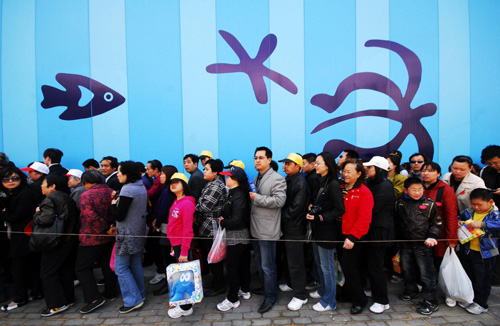Society
Chinese get used to queuing at World Expo
(Xinhua)
Updated: 2010-04-26 10:08
 |
Large Medium Small |
SHANGHAI - Chinese people have a reputation of being queue jumpers. That's why before big international events, for example, the 2008 Beijing Olympics, training Chinese people to queue up has become an important job for organizers. The Shanghai World Exposition is no exception.
 Visitors line up to enter the World Expo Park during a fifth trial operation on April 25, 2010. [Photo/Xinhua] |
Organizers expect more than 70 million visitors to visit the World Expo Park from May 1 to October 31.
At 11:20 am Friday, Zhao Liping complained to her friends when queuing to visit the France Pavilion.
|
Related readings: |
Zhao, 57, who has been to Japan several times, said thousands of people line up when Japanese shopping malls start to sell Fukubukuro, or lucky bag, however mall staff will direct people where to join the queue.
"It's more convenient," she said. However, she said people here also were behaving well.
"You see, there are no lines or bars to guide us, but we just consciously stand one by one, with hardly any people jumping the queue," she said.
The queue went for some two kilometers. As it was near to the noon, some people began to eat their lunch in the queue.
As it's still in the trial operation period, only some 20 state pavilions opened to visitors Friday, therefore, all the pavilions had crowds lining up outside.
Early in the morning at 9:30 am Friday, a line formed, waiting for "boarding the moon boat," outside the Saudi Arabia Pavilion, which cost the most to build of all the foreign pavilions, coming to more than one billion yuan (about $147 million).
An old guy with a walking stick, accompanied by a middle-aged woman was allowed to jump the queue by others in the line. However, when two women claimed that they had fallen behind their tourist group and asked to move forward, no one made way for them.
"You should not delay others because of your own fault," a young man said to the two women.
At 12:05 pm, Zhao Liping and her friends finally got their turn to enter the pavilion. She said it's OK to wait 45 minutes on such a cool day, however, she was worried for the visitors, especially the elderly, who will come in summer.
She suggested more umbrellas be put in rows outside the pavilions.
"On the one hand, they may protect visitors from the sunshine; on the other, they can be used to guide people to queue," said Zhao.
She also suggested that a special queue should be opened for the elderly, so for example people aged 70 and above can quickly enter the pavilions.
Li Yinzhong, 80, said he had enjoyed the privilege twice in the France and Italy pavilions. People over 80 years old can quickly enter the pavilions with a companion. However, outside the US Pavilion, he stood in the line for one hour before having a look around it for three minutes.
"It's kind of difficult for us old people to queue, but it's inevitable and understandable," Li said.
"I do exercise every day, but I don't think every old person can stand such a long time standing in the sunshine," he said, adding that he hoped every pavilion can open special entrances for the elderly.
But things don't always go smoothly. On the same day, outside the Thailand Pavilion, Yada Terdsudithironapoom, a volunteer of the pavilion, told Xinhua that people just rushed into the pavilion just before a film about Thailand started, which was played four times a day.
"It was chaos," she said, shaking her head. "Some people are polite; some are not."
Another volunteer, Jaroonroj Satitkasem, who is also from Thailand, wrote down the Thai pronunciation of some Chinese sentences in his palm, including "Disabled people, this way please!" "Back off!" "You can not go this way."
"The most frequently used is 'Don't crowd in!'" he said.
Actually, on Tuesday, the first day of the trial operation, chaos was reported in several areas inside the park due to malfunction of reservation machines, change of opening times for pavilions, or just too long a time waiting.
The organizers admitted the problems and have already worked out measures to improve the situation, for example, informing the public of numbers of visitors in respective areas.
Some people were afraid of the long lines and decided to save their time and energy.
Tian Yuling, who visited the park with her husband, said they would only visit the World Expo Theme Pavilion and the China Pavilion, which both required people to make reservations instead of queuing.
"We only need to wait for a little while when it comes to our reservation time this way. It's better for us old people for sure, " said the 62-year-old.
The couple brought with them some bread for lunch, also to avoid waiting in lines in the restaurants inside the park.
"Our neighbors who came yesterday told us they had waited for more than an hour to buy food, so we decided to bring our own food," said Tian, with a smile.
As she hoped to visit as many state pavilions as possible, she has to queue.
What can you do to kill time when you are waiting in a long line? In the World Expo Park, some people eat snacks, some study maps of the park, some talk to each other, some take pictures and some just patiently wait in line.
Research has revealed that people decide whether they want to develop relations with each other in the first three seconds they meet. There's probably time then to find romance while you're waiting in line at the Shanghai World Expo. Will you hope to find that while you wait?











